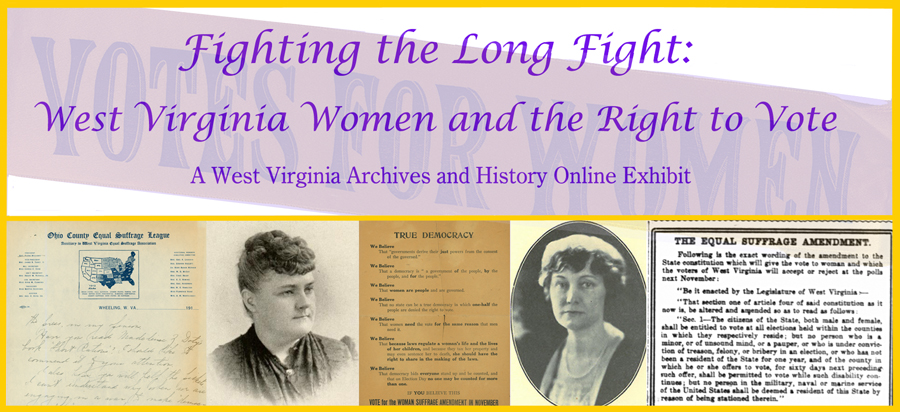

Fairmont Contains Many Very Earnest Advocates of Equal Suffrage. The collapse of the effort to have the suffrage amendment ratified in this state was a very sharp disappointment to many of the women of this city, which includes among its citizens of both sexes some of the most earnest supporters of equal suffrage in the state. One of the best known women of the city this morning sent to The West Virginian the following statement, which she says represents the views of herself and some of her friends on the outcome at Charleston: “All my life I have been proud that I am a West Virginian. I have believed in our little rugged Mountain state—have loved her and boasted in all honestly that in all the states in our Union she stood unexcelled. Now for the first time, I am ashamed for her! Ashamed that she has repudiated her womanhood! “I have watched the other states—thirty-three of them—as, one by one, they have said through their legislatures, “Why surely we believe in our women! We know they are capable and have the right to help us decide the kind of laws we shall have and the type of people who shall administer these laws over the boys and girls they are trying to raise to strong clean manhood and womanhood. We are glad to give them this privilege.[“] I, have watched these states, feeling so sure my own would take her place among the progressive, enlightened states. “But she has failed in her testing time! With the eyes of all the other states fixed on her, with the President of the United States, the Governor of the state, the leaders in both parties urging ratification, our legislators have said “no, no. It would not do at all! You know there are quite a number of ignorant women who would be swayed by unscrupulous politicians and that would be a very great menace. “Well Mr. Anti Legislator how about the husbands of these women—equally ignorant and unscrupulous. You have not seemed excited about their registration day in some sections of our state. There has been quite an influx of gentlemen of color from Alabama and Georgia, and instead of being considered a ‘menace’, they have been carried to the voting precincts in automobiles and some have even secretly wondered if they have not been recompensed for the time wasted in voting. “But you say, ‘an overwhelming majority voted against suffrage a few years ago.’ Yes, quite a number of men did do so. Have women ever been given the opportunity to express themselves? Then remember, too, that we had no prohibition then, and you, Mr. Anti, knew that if we got to vote whiskey would have to go. Now it’s gone and surely you have not in your mind the thought that there might be another fight on the question and so you should keep us out! “Well, you say, ‘there is no telling what may happen in these unsettled times and we should be prepared,—but your women do not want to vote. We grant you that there are quite a number who do not want to accept the responsibility but suppose they do not. We would not force it on them. Just as long as they want they may ‘sit on a cushion and sew a fine seam, and feat upon strawberries, sugar and cream.‘ These women, no doubt sincere in their objections, I am sure do not realize that they are lining up with the liquor element, the opponents to good child labor laws[,] the elements of vice in our country. But granted that they are sincere, why should they keep the rest of the women—the thinking, conscientious mothers, who want to make their state and their town just as pure and clean as possible—who want to help get the fairest, most just laws possible and the cleanest, best people to administer them—who have been identified for years with all movements for moral and civic betterment—why should they debar these? “No, Mr. Anti Legislator—elected as you were by parties which had openly declared for suffrage—you failed us! We thought we had proved ourselves during the war. You did not then object to our standing by your side and working shoulder to shoulder in all the hard gruelling drives for funds. You did not then seem afraid we might get jostled by the crowd. Then there was never a night too stormy for us to go with you to the far ends of our county to a little school house to beg for money. There was then no hill in the country too steep or hard for the country woman to cross going from farm house to farm house begging. There was no sun too hot for us to march weary miles by your side in street parades. There was no question then of the rebuffs we might meet in our house to house canvass for funds. There was none of the office work too tedious, none of the Red Cross work too hard for us. “But now you are saying that the most ignorant, immoral unprincipled man is a ‘citizen.’ The foreigner unable to speak a word of English—unable to answer the simplest questions about our government—without the least idea of our American customs, Americans ideals, American patriotism—is a ‘citizen’ as soon as he has gotten a few papers from the court. But I—a typical American woman, with a fair education, with a true love of my native land, with a loyal desire to make it just the best possible land in which to raise my children to God-loving manhood and womanhood,—I am not a ‘citizen.’ I have not the voice on my government that my illiterate brother from China or Italy has. I am only a West Virginia Woman. |